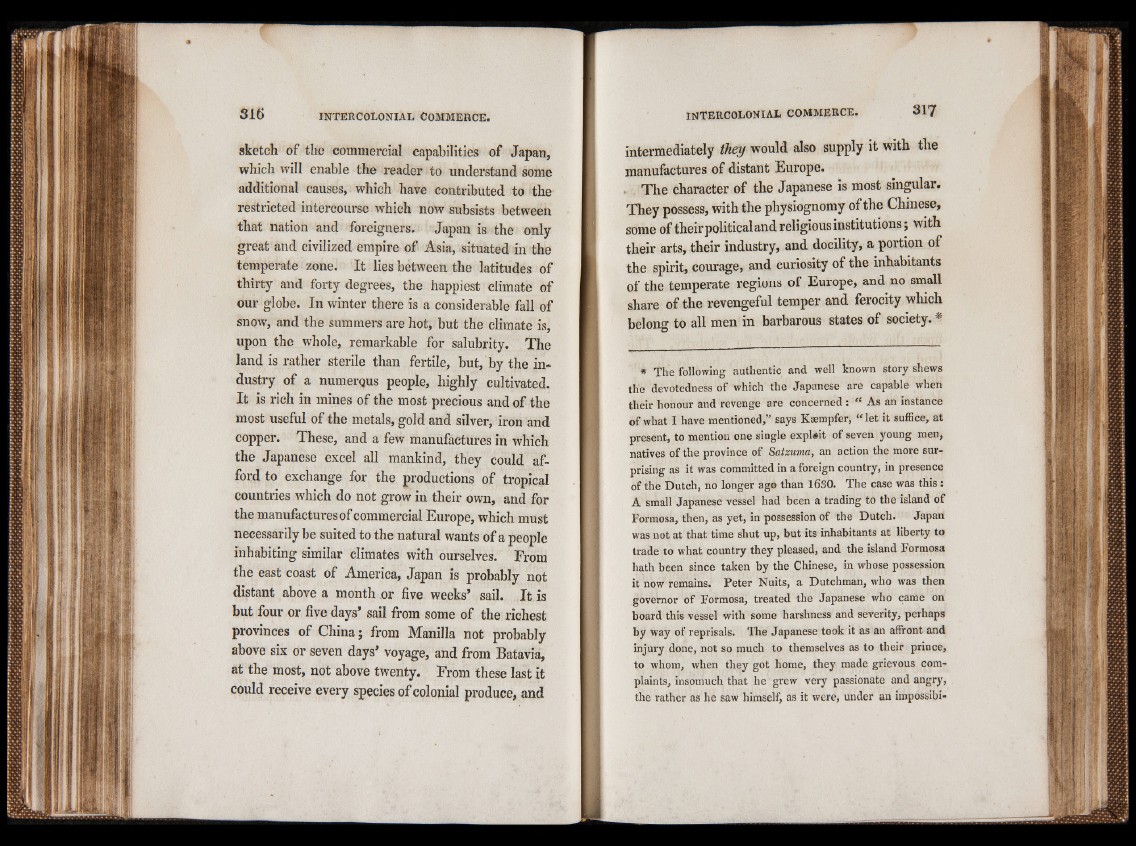
sketch of the commercial capabilities of Japan,
which will enable the reader to understand some
additional causes, which have contributed to the
restricted intercourse which now subsists between
that nation and foreigners. Japan is the only
great and civilized empire of Asia, situated in the
temperate zone. It lies between the latitudes of
thirty and forty degrees, the happiest climate of
our globe. In winter there is a considerable fall of
snow, and the summers are hot, but the climate is,
upon the whole, remarkable for salubrity. The
land is rather sterile than fertile, but, by the industry
of a numerqus people, highly cultivated.
It is rich in mines of the most precious and of the
most useful of the metals, gold and silver, iron and
copper. These, and a few manufactures in which
the Japanese excel all mankind, they could afford
to exchange for the productions of tropical
countries which do not grow in their own, and for
the manufactures of commercial Europe, which must
necessarily be suited to the natural wants of a people
inhabiting similar climates with ourselves. From
the east coast of America, Japan is probably not
distant above a month or five weeks* sail. It is
but four or five days’ sail from some of the richest
provinces of China; from Manilla not probably
above six or seven days* voyage, and from Batavia,
at the most, not above twenty. From these last it
could receive every species of colonial produce, and
intermediately they would also supply it with the
manufactures of distant Europe.
• The character of the Japanese is most singular.
They possess, with the physiognomy of the Chinese,
some of their political and religious institutions; with
their arts, their industry, and docility, a portion of
the spirit, courage, and curiosity of the inhabitants
of the temperate regions of Europe, and no small
share of the revengeful temper and ferocity which
belong to all men in barbarous states of society. *
* The following authentic and well known story shews
the devotedness of which the Japanese are capable when
their honour and revenge are concerned ; “ As an instance
of what I have mentioned,” says Kaempfer, “ let it suffice, at
present, to mention one single expkit of seven young men,
natives of the province of Satzuma, an action the more surprising
as it was committed in a foreign country, in presence
of the Dutch, no longer ago than 1630. The case was this :
A small Japanese vessel had been a trading to the island of
Formosa, then, as yet, in possession of the Dutch. Japan
was not at that time shut up, but its inhabitants at liberty to
trade to what country they pleased, and the island Formosa
hath been since taken by the Chinese, in whose possession
it now remains. Peter Nuits, a Dutchman, who was then
governor of Formosa, treated the Japanese who came on
board this vessel with some harshness and severity, perhaps
by way of reprisals. The Japanese took it as an affront and
injury done, not so much to themselves as to their prince,
to whom, when they got home, they made grievous complaints,
insomuch that he grew very passionate and angry,
the rather as he saw himself, as it were, under an impossibi